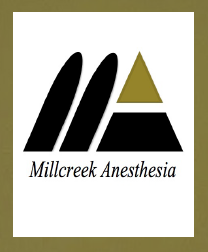Millcreek Anesthesia Physician Anesthesiologists provide inpatient, outpatient, obstetrical and office based anesthesia services at St. Mark's Hospital, St. Mark's Outpatient Surgery Center and Lone Peak Hospital.
We are committed to providing a positive surgical and obstetric experience with the highest quality anesthetic care.
About Millcreek Anesthesia

Millcreek Anesthesia was founded in 1991 by a group of eight Physician Anesthesiologists who had been practicing together at St. Mark's Hospital.
Millcreek Anesthesia remains an all physician group that has now grown to include thirty-two Board Certified or Board Eligible Anesthesiologists. We have a long history of being the exclusive providers of quality anesthetic care at St. Mark's Hospital, St Mark’s Outpatient Surgery Center and Lone Peak Hospital in partnership with your surgeon, obstetrician or care provider.
What To Expect
There are three main types of anesthetics that may be administered by your anesthesiologist for your surgery.
-
Monitored Anesthetic Care
You will be given intravenous sedation and pain medicine to help you feel relaxed and reduce pain. Your surgeon will then administer an injection of numbing medicine to block pain in the local area of your surgery. Although you are not completely asleep, it is likely you will not remember the surgery.
Your anesthesiologist will remain with you and continuously monitor your status to ensure your comfort and safety.
-
Regional Anesthesia
An injection of numbing medicine is administered by your anesthesiologist to block nerves. This may include blocking the nerves to an extremity or a larger area. An epidural block for childbirth is another example of a regional anesthetic. Regional anesthesia may also be combined with sedation or a general anesthetic. This type of anesthetic is also used to provide pain control after the surgery when long lasting medications are used or a catheter is left in place after the surgery.
-
General Anesthesia
You are completely unconscious and asleep for the surgery.
At Home
You will be asked to fast before your surgery so your stomach is empty when your anesthetic is administered. Frequently, you will be asked to have nothing to eat or drink starting at midnight on the day of your surgery. Even if your surgery is scheduled for later in the day, please follow the fasting instructions you receive at your pre-op visit as your actual surgery time may change.
At St. Mark's Hospital
You will be transported from Ambulatory Care to the Operating Room in a hospital bed or stretcher. You will meet your anesthesiologist in the Pre- operative Holding Area. We will ask you questions about your medical, anesthetic and surgical histories. We will discuss your specific anesthetic plan and answer all questions you may have. You will also meet your Operating Room nurse and have the opportunity to speak with your surgeon or their assistant before you are transported to the operating room.
Please see the following link to the American Society of Anesthesiologists website for more information about Anesthesiologists and anesthesia.
Billing Contact
abeo
150 Civic Center Drive
Suite 200
Sandy, UT 84070
(801) 727-2059
abeo.com
Pay your bill online click here
